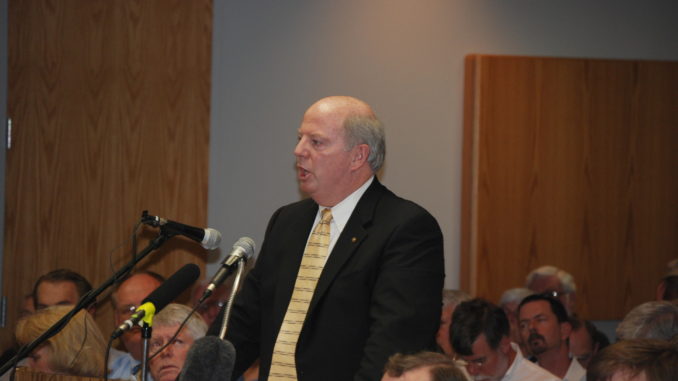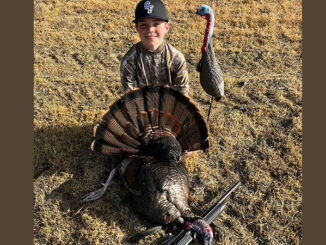
ROPER, N.C. (April 9) – An overflow crowd spilled into a parking lot full of farm tractors and “No OLF” posters Wednesday night, as more than 600 people gathered to show their opposition to the U.S. Navy’s proposed Outlying Landing Field in Washington and Beaufort counties.
N.C. Wildlife Resources Commissioners Wes Seegars, Ray White and Durwood Laughinghouse spoke against the proposal in front of a packed convention hall at the Vernon G. James Research and Extension Center.
“We do not want to believe that the Navy is so arrogant that they decided months or years ago that the Pocosin Lakes site was theirs for the taking – regardless of environmental issues, better and safer alternative sites, and the wishes of the people they are sworn to serve,” said Seegars, chairman of the Wildlife Commission. “What is difficult to understand about this problem is that it can be solved so easily. Just pick an alternative site.”
Afterward, Seegars said his comments stood for thousands of North Carolinians.
“I think it’s incredibly important to represent the wishes of all the people,” he explained. “I represent 847,000 licensed conservationists across the state and of all the folks we’ve talked to, we’re not aware of a single one that supports this facility at this location.”
The Navy’s proposal to build a practice strip for jet pilots to simulate aircraft carrier landings has come under heavy criticism from various groups. The location, a 30,000-acre tract known as Site C, sits just 3.5 miles from Pocosin Lakes National Wildlife Refuge, which serves as one of the Atlantic Flyway’s most critical wintering grounds for tundra swans and snow geese.
In order to conduct an estimated 32,000 annual flights that would take place each year, the Navy would need to effectively manage the nearby waterfowl populations. Among other proposed techniques, the use of the toxin Avitrol has been suggested in Navy documents, despite its illegal status in the Tar Heel state.
Seegars said he has no idea why the Navy prefers Site C over other locations that were initially considered, especially in view of the danger of plane-and-bird collisions near the refuge.
“The Governor and others have repeatedly tried to convince the Navy to go to other locations,” said Seegars minutes after finishing his public comments. “The Wildlife Resources Commission would love to have the OLF, just not at this particular site. Nobody, quite frankly, understands the Navy’s insistence of this site. They have been totally uncooperative in trying to work with the state on the selection process. We’ve got other counties that would like to have it that don’t have the wildlife issues.”
Durwood Laughinghouse, another commissioner with the N. C. Wildlife Resources Commission, followed Seegars’ comments by reading into record a resolution drafted that morning.
Area farmers and anti-OLF groups began gathering outside the Vernon G. James Research and Extension Center by 2 p.m. Many of the farmers arrived in tractors, which were parked across the front lawn and decked out with signs and posters expressing opposition to the Navy’s proposal.
Wednesday night’s event was the sixth in seven public hearings conducted by the Navy. The final hearing will take place April 17 at the Charlotte Convention Center, 501 South College Street, Charlotte 28202.


Be the first to comment